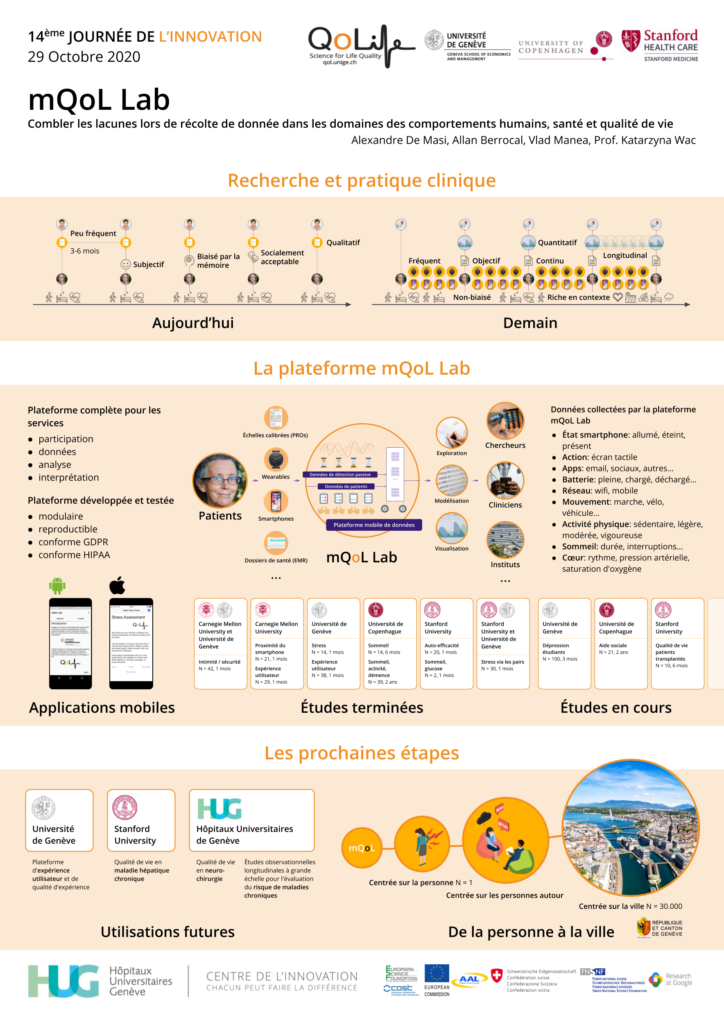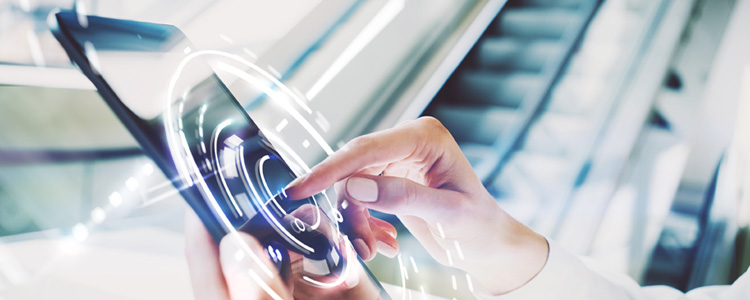Distributing smartphones to real people as part of our research involves collecting information from each phone, which sometimes involves information considered as private. Thus, it is critical for us to make sure that each participant understands what data is collected and how it is used. Here, we give an overview and then explain what information we collect and why in more detail.
Methodological Approach
- Protecting participants is our priority: mQoL is a participatory testbed and a living lab; this means that without participants like you, mQoL cannot exist. Because of this reason, from the inception of mQoL, we have been considering participant protection as one of the priorities in our decision-making process.
- Our operation of mQoL is transparent: This means that at any point of time if a participant wants to know what information has been collected, how it is used, or even where it is stored, we will provide the answers to the participant. Any participant can withdraw his/her consent anytime and request to delete his/her datasets, without any negative consequences.
- Research studies require university ethics committee approval: Getting ethics approval is common in the fields of medicines and psychology, where research studies involve human subjects. The approval process requires each experiment to be reviewed by a group of experts to ensure that the experiment protects the rights of the participants and is safe. Each of the mQoL research experiments requires such approval as part of our protection mechanism for participants. All of the studies conducted in Geneva/Copenhagen/at Stanford have been approved by its local university ethics committee. Approved protocols are listed on this QoL website.
Types of Research Methods & Datasets Collected in mQoL
Quantitative Research & Data Collected in Our Research Studies
We collect information from your smartphone for the following purposes, and the types of information we collect depend on each purpose.
- Phone Status: We will periodically check if the phone is ON and operating properly since knowing the ‘health’ of each smartphone is obviously crucial for our operation. In case of erroneous operation we may email you with instructions to install an app, reboot your phone and/or connect to WiFi for synchronization.
- Phone location: We will periodically record where the phone is based on its operator’s cellID and WiFi information. We do not collect your GPS logs. We will use this information strictly for our operational reasons, including the location of the smartphone when it is lost or stolen. We will not release this information to anybody outside of the QoL team.
- Phone battery level: As mentioned above, each smartphone runs our applications (i.e., software). Thus, it is important to minimize any potentially disruption that our software might cause for your normal smartphone usage. For this purpose, we will monitor the battery level of your smartphone to avoid performing any task that can potential drain much battery. Actually, our applications and services are instructed to deactivate themselves (i.e., ‘sleep’) once your battery level reaches 20% or below. The applications and services become activate again once the phone charging begins.
- Application logs: Each smartphone app usually generates information (called logs) for troubleshooting. As part of our effort to ensure that each smartphone operates properly, we will collect these logs.
- Network performance: As part if our Swiss NSF MIQmodel project and it continuation beyond 2018, in the mQoL study we test the performance of whichever network you are connected to: WiFi, 2.5G, 3G or 4G. However, please use your phone as usual; we do not ask you to be connected to a given network at a given time.
We may provide you with a wearable or collect some information from a wearable you are already using. This information may include sleep, steps, heart rate and it depends on the wearable being used. See example commercially available wearables integrated within the mQoL Living Lab here. Any ideas for new wearables to integrate in our lab are welcome!
Qualitative Research & Data Collected in Our Research Studies
- Intra-day Surveys: Experience Sampling Method (ESM)/Ecological Momentary Assessment (EMA): Usually our research questions relate to some phenomenon of your daily life activities. To gather your instantaneous opinions about that phenomenon, in a minimally intrusive for you way, we employ the ESM method. In practice it means that you will have to answer a short survey automatically appearing on the screen of your smartphone along the day. The survey will appear at random, or at given times, depending on the phenomenon we study. The survey will have some questions specific to our research questions. The completion of survey will take maximum 30 seconds of your time. Our experiments constitute of no more than 8-12 surveys in total being requested per a day – in your waking hours (e.g., 8-22h, to be adjusted for your preferences).
[Scientific reference for the ESM method: Hektner J., Schmidt J., Csikszentmihalyi M., Experience sampling method: Measuring the quality of everyday life. In Sage Pubs Inc., 2006. DOI]
- Interviews: Day Reconstruction Method (DRM): You will be asked to meet us face-to-face on a regular basis, for example once a week for a 4-week research study. We will interview you for a ground truth about the phenomenon of your daily life activities, as an object of our studies. This information will be compared to the data automatically logged on the phone. You will particularly be asked to complete a diary of the previous 24-hour period wherein you will record the phenomenon of your daily life activities, as studies by us. It is called the Day Reconstruction Method and it breaks the day into episodes described by activities, locations and time intervals, and the smartphone usage during these times. During the interview, you will explain to us, in more detail, the factors influencing your ESM answers from the last 24 hours. This way, we can identify causalities and relations between your smartphone usage, your context and the phenomena we study. Additionally, we can identify any inconsistencies in the data logged automatically on the phone and ESMs.
[Scientific reference for the DRM: Kahneman D., Krueger A., Schkade D., Schwarz N., and Stone A., A Survey Method for Characterizing Daily Life Experience: The Day Reconstruction Method, Science, 2006: 306(5702), pp. 1776-1780. DOI]
- Intra-day Peer-Based Surveys: In some studies we ask you to include your peers – family members or friends. Similarly to your ESM/EMA surveys – we ask them to provide their instantaneous opinions on your observable behaviours (e.g., if they perceive you hydrate enough) or states (e.g., if they perceive you are anxious) via a short survey automatically appearing on the screen of their smartphone along the day. We defined this method as Peerceived Momentary Assessment (PeerMA). It has the same characteristics as ESM/EMA, as described above.
[Scientific reference for the PeerMA: A. Berrocal, K.Wac. 2018. Peer-vasive Computing: Leveraging Peers to Enhance the Accuracy of Self-Reports in Mobile Human Studies. UbiComp. Association for Computing Machinery, New York, NY, USA, 600–605. DOI]
The mQoL-Lab is the infrastructure behind the mQoL Living Lab.


